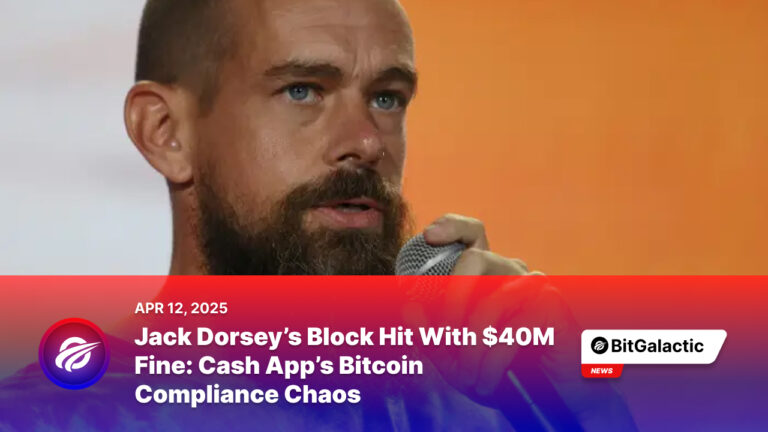Jack Dorsey’s Block Hit with $40M Fine: Cash App’s Bitcoin Compliance Chaos
Hey, BitGalactic crew! It’s your crypto guide with a decade in the game, and today we’ve got a bombshell: Jack Dorsey’s Block just got slapped with a $40 million fine for some serious compliance fails in Cash App’s Bitcoin feature. Why does this matter to you? Because it’s a wake-up call for the whole crypto space. Stick around for the juicy details, my take on what went wrong, and what’s next. Let’s dive in!
So, here’s the deal. New York’s financial regulators dropped a $40 million penalty on Block, the company behind Cash App, for dropping the ball on anti-money laundering and know-your-customer rules. Apparently, as Cash App rolled out Bitcoin trading back in 2018, they didn’t beef up their compliance team to match the growth. Big mistake. A 2022 internal report found over 8,300 accounts tied to a Russian crime ring using Cash App to move money. That’s not just a glitch—it’s a red flag the size of a skyscraper.
Now, as someone who’s been in crypto since Bitcoin was a nerd’s dream, this doesn’t shock me, but it does disappoint me. Block’s a giant in fintech, and Cash App was one of the first mainstream apps to make Bitcoin accessible. But accessibility without accountability? That’s a recipe for trouble. Here’s the kicker: crypto’s decentralized vibe attracts both innovators and bad actors. If you’re running a platform like Cash App, you’ve got to have eagle-eyed oversight.
Let’s talk numbers for context. In 2024, Chainalysis reported that illicit crypto transactions hit $20 billion globally, with exchanges and apps like Cash App being prime targets. Block’s slip-up isn’t just about one fine—it’s about trust. If users think their Bitcoin trades are funding crime, they’ll bolt. And with competitors like Coinbase and Binance tightening their compliance, Block’s playing catch-up.
This isn’t Block’s first rodeo. Rewind to 2022: a rogue employee leaked data from 8 million Cash App users. Ouch. Then, earlier this year, Block coughed up $80 million to settle with 48 U.S. states over similar compliance issues. Compare that to Mt. Gox in 2014, when a hack lost 850,000 Bitcoin because of sloppy security. History screams one thing: ignore compliance, and you’re toast. Block’s lucky this fine is only $40 million—Mt. Gox went bankrupt.
So, what’s my prediction? Block’s already touting a new AI-driven fraud detection system, which sounds promising. Machine learning plus human oversight could plug these holes, but it’s late in the game. With regulators cracking down—especially in New York, the compliance capital of the world—I see more fines unless Block gets its act together.
Long-term, this could push crypto platforms to adopt stricter rules, which isn’t all bad. It might weed out shady players and make Bitcoin more legit for mainstream adoption. But here’s my worry: overregulation could choke innovation. It’s a tightrope, and Block’s wobbling.
What do you think? Is Block’s fine a fair punishment, or are regulators going too hard on crypto? And how do you feel about Cash App for Bitcoin trading now? Drop your thoughts in the comments—I read every single one.
That’s a wrap, galactic traders! If you loved this deep dive into Block’s drama and what it means for crypto, hit that like button and subscribe to BitGalactic for more no-BS crypto breakdowns. Ring the bell so you never miss an update—we’re dropping knowledge weekly. Stay savvy, and I’ll catch you in the next one!
Share this post


